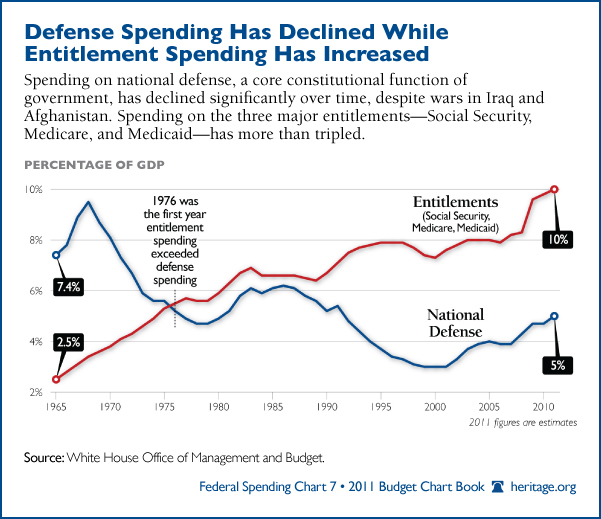What happens if the “super committee” fails to meet its target of $1.5 trillion in budget savings by Thanksgiving and sequestration is triggered? It would spell doomsday for the military, Defense Secretary Leon Panetta warns.
In letters sent to Senators John McCain (R-AZ) and Lindsey Graham (R-SC), Panetta said that under the worst-case scenario, “the total cut will rise to about $1 trillion compared with the FY 2012 plan,” and he says “The impacts of these cuts would be devastating for the Department.” Panetta went on to detail what those cuts would mean in practical terms, including “the smallest ground force since 1940, the smallest number of ships since 1915, and the smallest Air Force in its history”:
The Daily Signal depends on the support of readers like you. Donate now
Such a large cut, applied in this indiscriminate manner, would render most of our ship and construction projects unexecutable – you cannot buy three quarters of a ship or a building and seriously damage other modernization efforts. We would also be forced to separate many of our civilian personnel involuntarily and, because the reduction would be imposed so quickly, we would almost certainly have to furlough civilians in order to meet the target. These changes would break faith with those who maintain our military and seriously damage readiness.
Politico reports that Panetta also warned that the super committee’s failure “could also force cancellation of the F-35 Joint Strike Fighter program, the Army’s new ground combat vehicle and helicopter modernization programs, along with a planned missile defense shield in Europe.” Heritage’s Mackenzie Eaglen also notes that, should the supercommittee fail to reach an agreement that spares defense, other consequences include “job losses for highly skilled workers in the shipbuilding, defense, and aerospace production workforces.”
As the military sits on the chopping block, spending on the three major entitlements—Social Security, Medicare, and Medicaid—has more than tripled (as the chart below shows). And that’s despite wars in Iraq and Afghanistan–and the fact that defense is a a core constitutional function of the federal government.
With exploding entitlement spending, a growing debt, and defense at risk, what’s the solution for the super committee? Heritage vice president David Addington explains:
The Heritage Foundation has consistently urged, and continues to urge, that the congressional Joint Select Committee on Deficit Reduction, known as the Supercommittee, “go big” with its recommendations, to “drive federal spending down — including by fixing ever-expanding entitlement programs — toward a balanced budget, while preserving our capability to protect America, and without raising taxes.” Heritage provided a detailed plan by which the Supercommittee could accomplish that goal. Heritage President Edwin J. Feulner made clear that “[t]his battle is about both getting spending under control and limiting the size and scope of government.” As he said, “[m]ore taxes means more government.”
Conservatives, please remember and achieve the objective: drive federal spending down — including by fixing ever-expanding entitlement programs — toward a balanced budget, while preserving our capability to protect America, and without raising taxes.
































